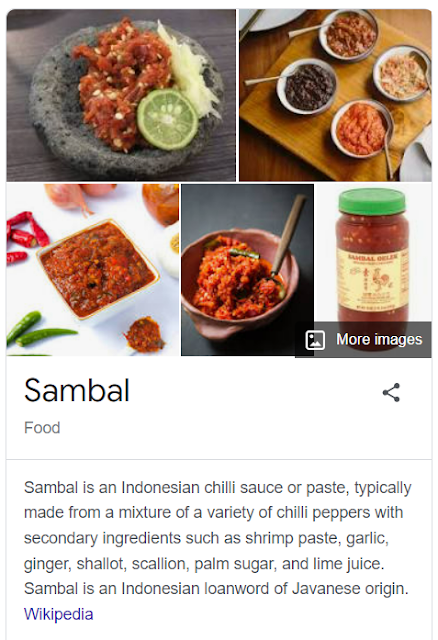- Get link
- X
- Other Apps
Posted by
Iman Prabawa
on
- Get link
- X
- Other Apps
Halo semuanye, ketemu lagi ama aye, Iman Prabawa. In this article, I'm going to be talking about the meaning of the word [takis] in Indonesian. As always, we are also going to be looking at examples from movies, YouTube videos, comics, and others where the word [takis] is used by Indonesians.
If you have any questions regarding the Indonesian language, you can ask me directly. You can see how to do that on my About Me page.
If you are a beginner in the Indonesian language, you can learn step by step with My Lesson Here.
So, without further ado, let's get started!
Takis In Indonesian
[Takis] is considered a slang word. It comes from the word [sikat], but you read it backward. [Sikat] and [takis] have the same meaning.
The first meaning of [takis] is to do something immediately or straight away without wasting any more time.
Example sentence:
1. Semuanya. Yuk takis aja langsung makanannya sekarang. (Everyone. Without wasting any more time, you can go ahead and eat the food now.)
2. Masbro, dia udah jomblo tuh. Langsung takislah sebelum diembat ama yang lain. (Bro, she is single now. Come and get her immediately before anyone does it.)
The second meaning of [takis] is to beat someone. Here, it has the same meaning as [pukul] or [hajar].
Example sentence:
1. Langsung takis ajalah, ngga usah kebanyakan bacot! (Just start beat him already, and no more talk!)
How to Pronounce Takis
Here is how you pronounce [takis] in Bahasa Indonesia.
Moving on, let's look at examples where Indonesians use the word [takis].
Example of Takis In Use
The first example we are about to watch is taken from Bang Mpin's YouTube Channel. Let's look at the clip below.
Bang Mpin: Sebelum makan, kita doa dulu ya. Amin. Kita bakal cobain tanpa pake sambel. Sebenernya tu gue kalo makan tu demennya tu tanpa pake sambel dulu, gaes. Biar kita racik. Biar kita bisa tau rasa aslinya. Tuh! Mienya mantep, ya? (Before we eat, let's pray first. Amen. First, we're gonna try it without sambel. Actually, when I first try to eat something, I wanna eat it without sambel, guys. So, we can mix it. So we'll know what the original taste would be like. Look at this! Isn't the noodle awesome?)
Juru Kamera: He'eh. (Agreed.)
Bang Mpin: Tampilan tu oke banget. Takis? (Its look is so impressive! Shall we eat?)
Juru Kamera: Takis Boss!! (Go ahead, boss!)
In this clip, before starting to eat, Bang Mpins says,
Takis? (Eat now?)
And then the cameraman says,
Takis boss! (Yes, go ahead!)
And then Bang Mpin starts to eat the noodles.
Vocabulary From the Scene
[Bang] is an honorific title to address a man. For more about this, you can read my article here, Bang In Indonesian. So, Bang Mpin here, his name is Mpin, and [bang] is an honorific title to call him before his name.
[#lapernular] <--- There are two words joined together here. [Laper] is informal for [lapar] = hungry, and [nular] is a common reduction for [menular] = infectious. So, [lapernular] means that the feeling of hunger as a result of watching him eat can be contagious.
[Juru Kamera] = cameraman.
[Sebelum] = before.
[Makan] = eat.
[Sebelum makan, kita doa dulu ya] <--- Here, Bang Mpin drops [ber] in [berdoa], and it is common in conversational Indonesian, where native Indonesian speakers drop syllables like this. The full sentence is [Sebelum makan, kita berdoa dulu ya].
[Cobain] = [nyobain] is the colloquial word to say [mencoba] = to try.
[Kita bakal cobain tanpa pake sambel] <--- If I change this into a formal sentence, it would be [Kita akan mencoba tanpa menggunakan sambal].
[Sambel] is informal for [sambal]. Sambal is a traditional Indonesian chili sauce that looks like the picture below.
[Sebenernya] is informal for [sebenarnya] = actually.
[Gue] is informal for [saya] = I. For more about this, you can read my article here, Gue In Indonesian.
[Tu] and [tuh] are informal for [itu] = that. For more about this, you can read my article here, Tu In Indonesian.
[Kalo] is informal for [kalau] = if.
[Demen] = [senang] = [suka] = like.
[Tanpa] = without.
[Pake] is informal for [pakai] = use.
[Gaes] comes from the English word [guys].
[Racik] = mix something.
[Tau] is informal for [tahu] = know.
[Rasa] = taste.
[Mie] = noodles.
[He'eh] = yes. For more about this, you can read my article here, He'eh In Indonesian.
[Mantep] is informal for [mantap] = good, awesome.
[Oke banget] = very good.
[Tampilan tu oke banget] <--- Here, Bang Mpis drop [nya] in [tampilan] and the letter [i] in [itu] there. The complete sentence is [tampilannya itu oke banget].
Read also: Paling-Paling In Indonesian
That wraps up today's article. If I find another example, Insha Allah, I will update this article again. If you have any questions, you can leave them in the comment section below. Thank you, and I'll see you soon. Bye now.
- Get link
- X
- Other Apps
Hello, I'm Iman Prabawa a.k.a Pak Guru Iman. I love to share about languages. My Instagram, @iman_prabawa


Comments
Post a Comment